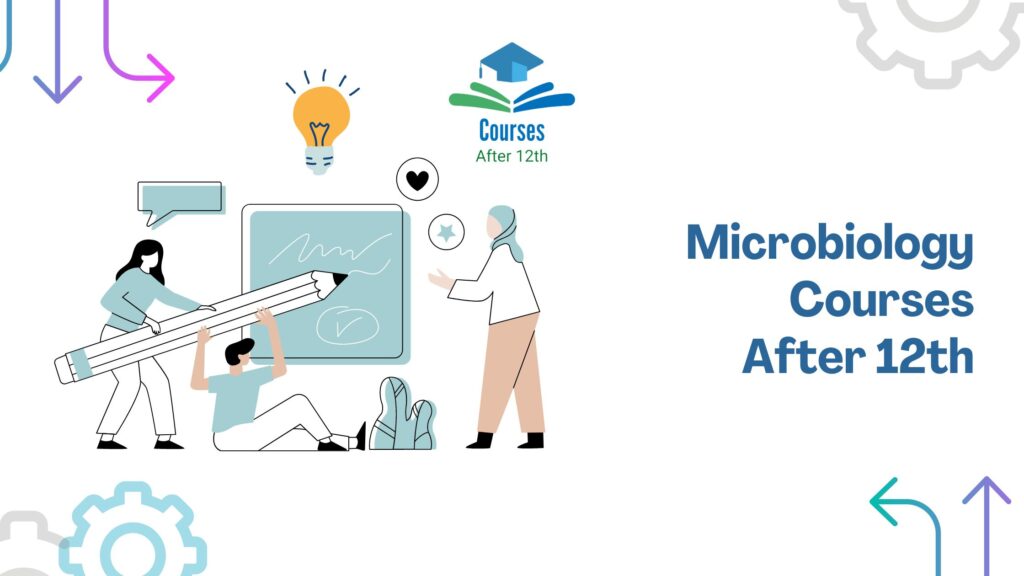
Microbiology is a captivating field that delves into the microscopic world of organisms that are often unseen to the naked eye. It’s a multidisciplinary science that combines biology, chemistry, genetics, and other disciplines to study microorganisms and their interactions with the environment and living organisms. If you’re intrigued by the world of tiny living beings and their impact on our lives, pursuing microbiology courses after 12th can open up exciting career avenues. In this article, we’ll explore the various aspects of microbiology courses, their specializations, career prospects, and more.
Microbiology courses after 12th are designed to provide students with a comprehensive understanding of microorganisms, their characteristics, behavior, and their role in various fields, including medicine, agriculture, food science, and environmental science. These courses delve into the study of bacteria, viruses, fungi, algae, and other microscopic organisms, exploring their structure, genetics, metabolism, and interactions with their surroundings. If you want to learn about Interior Design Courses After 12th, you can read this article and share your valuable feedback in the comment box below.
Eligibility Criteria for Microbiology Courses After 12th
To enroll in microbiology courses after 12th, students typically need to have completed their higher secondary education in the science stream, with a focus on biology, chemistry, and physics. Different universities may have specific eligibility criteria, so it’s essential to research and understand the requirements of the institutions you’re interested in.
Types of Microbiology Courses
Microbiology courses are offered at various levels, including undergraduate, postgraduate, and diploma programs. Some of the common types of courses include:
- Bachelor of Science (B.Sc.) in Microbiology
- Bachelor of Science (B.Sc.) in Medical Microbiology
- Master of Science (M.Sc.) in Microbiology
- Postgraduate Diploma in Microbiology
- Doctorate (Ph.D.) in Microbiology
Top Microbiology Specializations
Microbiology is a diverse field with numerous specializations that cater to different interests and career paths. Some of the popular specializations include:
- Medical Microbiology: Focuses on the study of microorganisms that cause diseases in humans and animals.
- Industrial Microbiology: Involves the application of microorganisms in industries such as food, pharmaceuticals, and biotechnology.
- Environmental Microbiology: Explores the interactions between microorganisms and the environment, including their role in nutrient cycling and pollution control.
- Microbial Genetics: Concentrates on the study of genetic material and variations in microorganisms.
- Agricultural Microbiology: Examines the use of microorganisms in enhancing soil fertility, crop growth, and pest control.
Career Prospects in Microbiology
Microbiology offers a wide range of career opportunities in various sectors, including:
- Medical and Healthcare: Microbiologists play a crucial role in diagnosing and treating infectious diseases. They work in hospitals, clinics, and research laboratories.
- Pharmaceutical Industry: Microbiologists are involved in drug research, development, and quality control.
- Food Industry: Microbiologists ensure the safety and quality of food products by monitoring microorganisms in food processing and preservation.
- Biotechnology: Microbiologists contribute to biotechnological advancements, including the production of biofuels, enzymes, and biopharmaceuticals.
- Environmental Agencies: Microbiologists analyze and manage microbial communities in natural ecosystems and address environmental issues.
Challenges and Opportunities in Microbiology
Microbiology presents both challenges and opportunities. Challenges include addressing antibiotic resistance, emerging infectious diseases, and ethical considerations in genetic research. On the other hand, the field offers opportunities to make groundbreaking discoveries, develop innovative therapies, and contribute to global health and sustainability.
Skills Required for Microbiology
Successful microbiologists possess a combination of technical skills, including laboratory techniques, data analysis, and research methodologies. Additionally, strong communication, critical thinking, and problem-solving skills are essential for interpreting research findings and collaborating with interdisciplinary teams.
Scope of Research in Microbiology
Microbiology is a dynamic field that constantly evolves due to technological advancements. Research opportunities range from studying novel pathogens to exploring the potential of microbiomes in various applications.
Microbiology vs Other Sciences
Microbiology intersects with other scientific disciplines like molecular biology, genetics, and biochemistry. While biology provides a broader understanding of living organisms, microbiology focuses specifically on microorganisms and their impact.
Frequently Asked Questions (FAQs)
How can I do microbiology after 12th?
To pursue microbiology after 12th, you can enroll in a Bachelor of Science (B.Sc.) in Microbiology program offered by various universities. Ensure you meet the eligibility criteria and choose a reputable institution.
Does microbiology require NEET?
No, microbiology courses typically do not require NEET (National Eligibility cum Entrance Test) for admission. However, specific institutions may have their own entrance exams or criteria.
Which course of microbiology is best?
The “best” course in microbiology depends on your interests and career goals. B.Sc. in Microbiology, B.Sc. in Medical Microbiology, and M.Sc. in Microbiology are popular options to consider.
Is BSc microbiology enough?
A B.Sc. in Microbiology can provide you with foundational knowledge and open up various career opportunities. However, pursuing higher education such as an M.Sc. or Ph.D. can enhance your expertise and career prospects.
Conclusion
In conclusion, microbiology courses after 12th open doors to a fascinating world of microorganisms and their applications. Whether you’re passionate about healthcare, research, or industry, a career in microbiology offers opportunities to make significant contributions to science and society.
